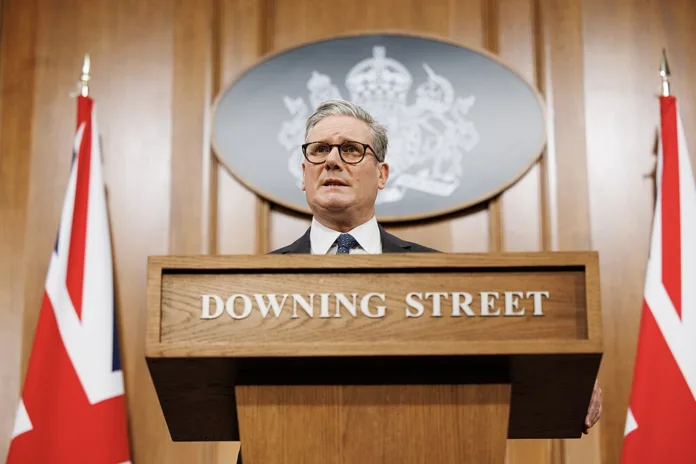PM faces mass backlash as digital ID fears ignite civil liberties outrage
Keir Starmer has doubled down on his controversial digital ID scheme, promising it will not threaten personal freedoms, even as millions of Britons rally against what they see as the dawn of a surveillance state.
The prime minister outlined his vision on Thursday during a visit to a Barclays branch in Brighton, where he told staff that digital IDs would “really help” protect customers from scams and fraud. But his reassurances have done little to calm growing public alarm over civil liberties, cybersecurity, and state overreach.
Starmer, already under fire for the policy’s poor reception, insisted the identification system would “never” be required to access hospitals or essential services. He told the BBC that digital ID “won’t be the case” for surveillance and stressed that those who did not want one would not be forced to have it — except for employment verification.
“You’ll never need ID to get into a hospital or anything like that,” he said. “And for people who simply don’t want it, well, they don’t need it, apart from the right to work, because we do need to stop people working illegally in our country.”
He compared the digital ID to existing smartphone functions, saying the idea was no different from carrying bank accounts or personal apps on one’s phone. “The idea of having ID on your phone is not that far removed,” he said. “Once you understand just how much easier it’ll make life, so many more people will be too.”
Despite the optimistic pitch, opposition to the plan is escalating. More than 2.9 million people have signed a petition against digital IDs, and public support has plummeted. Polling by More in Common shows net approval collapsing from +35% in the summer to -14% after Starmer’s September announcement.
Critics have labelled the project intrusive, expensive, and unnecessary. Detractors say the scheme opens the door to unprecedented government tracking and data collection, potentially putting citizens’ privacy at risk.
Peter Hyman, a former adviser to both Starmer and Tony Blair, warned that the plans could collapse within six months unless the government radically changes its approach. Speaking at the Labour Party conference in Liverpool, Hyman described the rollout as poorly communicated and said ministers had failed to convince the public of its benefits.
He cautioned that opponents of the digital ID were “motoring ahead” and that Downing Street was losing control of the narrative. To salvage the policy, Hyman urged officials to recruit social media influencers to tackle conspiracy theories and rebuild trust. Without such measures, he warned, the initiative could be “dead in the water.”
Meanwhile, the Liberal Democrats have seized on the backlash to deliver their most scathing criticism yet. Home affairs spokesperson Max Wilkinson accused the prime minister of trying to repackage a doomed project, saying: “Keir Starmer is trying to put lipstick on a very expensive pig. Relaunching this scheme for the second time this month won’t change the fact it is intrusive, expensive and unnecessary.”
The government insists the plan will simplify life for millions by allowing citizens and legal residents to prove their identity digitally — particularly those without passports or driving licences. Ministers argue that digital IDs will make opening bank accounts, applying for mortgages, or securing jobs faster and safer, without the need for physical paperwork or costly private verification services.
But for many, Starmer’s assurances ring hollow. Civil liberties campaigners warn that normalising digital identification marks a turning point in the balance between freedom and control. As petition numbers climb into the millions and scepticism spreads, the prime minister’s vision for a streamlined digital Britain is fast becoming a symbol of political overreach — and a defining test of his leadership.
